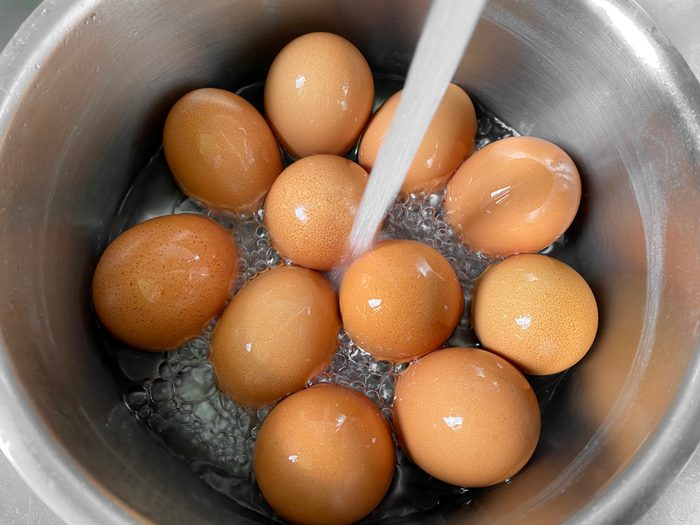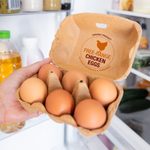Here’s Why You Shouldn’t Wash Eggs Before Cooking

Unwashed eggs aren't all that dirty, for starters.
When you prep ingredients for cooking, do you wash them? In many cases, the answer is yes, and your instinct would be correct. Many dried ingredients like rice actually taste better once you wash them, and certain fruits and veggies, like strawberries and lettuce, are prone to bugs or dirt. But did you know that washing your eggs is counterintuitive?
Not only does washing eggs hardly make a difference, but it can also put what’s inside at risk. Read on to find out why unwashed eggs are actually safer.
Why Do People Wash Eggs?
Why do people wash any ingredients? To make sure it’s safe for consumption and won’t spread germs, of course. The world outside our kitchens may not seem like the cleanest place. There’s dirt and disease, and maybe the chickens laying your supermarket eggs don’t have the cleanest coop.
But think of it this way: eggs are designed to keep what’s inside safe, and people have been eating them for a long time. Eggs already have everything the chicks inside need to sustain themselves, protection included—that is the magic of biology!
The best way to protect yourself from potential bacteria is to keep everything else clean. Wash your hands before and after touching eggs, and take the time to clean your kitchen.
Why You Shouldn’t Wash Eggs

Eggs have a natural coating on their shells called the “cuticle” or “egg bloom” that keeps air and bacteria out. Washing eggs actually increases the chance of contamination and will shorten their lifespan.
“Although eggshells seem as if they are not penetrable, they do in fact have small pores that allow for bacteria to enter and exit,” says Johane Filemon, RD. “The recommendation remains to not wash eggs as washing will increase the likelihood of bacteria entering the through the shells.”
Eggs at the grocery store are already washed and sanitized with compounds that are approved by the United States Department of Agriculture’s regulations for processing foods. Local eggs, whether farmed or from your backyard, also don’t need to be washed. If there are any bacteria, they will be killed by the heat in your pot of boiling water or your sizzling frying pan.
“Eggs from small farms or backyards should be treated with the same best practice guidelines,” Filemon says. “They are sometimes safer because you have more control when it comes to cleanliness if the eggs are coming from your own backyard.”
There are, however, cases where eggs can be washed, Filemon says: “If the eggs have come in contact with feces and debris, they may need to be cleaned. A cloth can be used to clean the shells. If that does not work, eggshells can be cleaned with unscented soap. Do not allow the eggs to soak in water. Soaking eggs in water allows bacteria to enter or exit. Cold water will pull bacteria into the shells and warm water will push the bacteria out of the shells.”
Raw eggs can sometimes carry salmonella, but as long as they’re heated to a proper temperature, you should be in the clear. Now if you’ve got an egg that’s cracked or smells funky, then by all means throw it out. Dispose of any eggshells after you crack them, and don’t put cracked eggshells back in the carton. “Cracks in the eggs are a sign that the egg should not be consumed,” Filemon says. “If you’ve cracked your egg open and notice discoloration or sulfuric smell, they’ve most likely gone bad.”
As a rule, animal products like meat, raw chicken, raw turkey and eggs come under the category of foods that should never be washed. If anything, you’re actually spreading bacteria to the rest of your kitchen. Fruits, vegetables, herbs, and grains are all things that should be washed, though.



